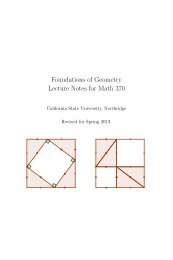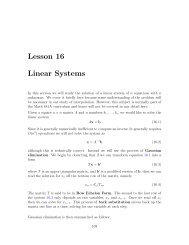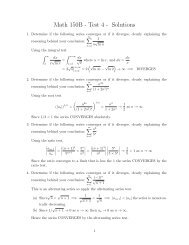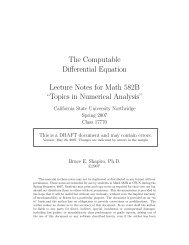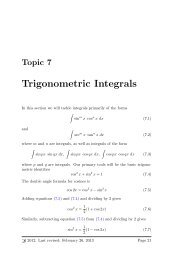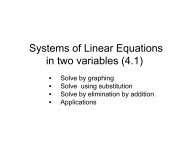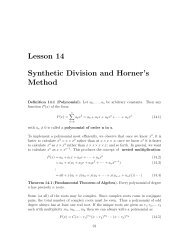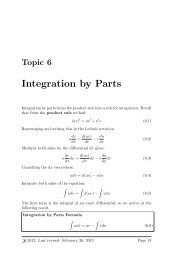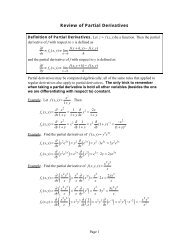Multivariate Calculus - Bruce E. Shapiro
Multivariate Calculus - Bruce E. Shapiro
Multivariate Calculus - Bruce E. Shapiro
You also want an ePaper? Increase the reach of your titles
YUMPU automatically turns print PDFs into web optimized ePapers that Google loves.
LECTURE 14. UNCONSTRAINED OPTIMIZATION 115<br />
Now we make the following substitutions,<br />
A = 1 2 g uu,0 = 1 2 f xx,P<br />
B = g uv,0 = f xy,P<br />
C = 1 2 g vv,0 = 1 2 f yy,P<br />
which gives us<br />
g(u, v) = Au 2 + Buv + Cv 2<br />
In other words, we have approximated the original function with a quadratic at the<br />
origin (note to physics majors: this is a generalization of a property called Hooke’s<br />
law to 2 dimensions).<br />
so that<br />
The function<br />
D(u, v) = g uu g vv − (g uv ) 2<br />
d = (2A)(2C) − B 2 = 4AC − B 2<br />
Completing the squares in the formula for g,<br />
g(u, v) = A<br />
[(u 2 + B A uv + B2 v 2 )<br />
4A 2 − B2 v 2<br />
4A 2 + C ]<br />
A v2<br />
[ (<br />
= A u + B ) 2 ( ) ]<br />
C<br />
2A v +<br />
A − B2<br />
4A 2 v 2<br />
[ (<br />
= A u + B ) 2 ( 4AC − B<br />
2<br />
2A v +<br />
= A<br />
[ (<br />
u + B 2A v ) 2<br />
+ d<br />
4A 2 v2 ]<br />
4A 2 )<br />
v 2 ]<br />
We have three cases to consider, depending on the value of d.<br />
Case 1: d > 0<br />
If d > 0 then everything in the brackets is positive except at the origin where it is<br />
zero. Thus the origin is a local minimum of everything inside the square brackets.<br />
The function g is a paraboloid that extends upwards around the origin when A > 0<br />
and downwards when A < 0. Thus if A > 0, we have a local minimum and if A < 0<br />
we have a local maximum.<br />
Math 250, Fall 2006 Revised December 6, 2006.




